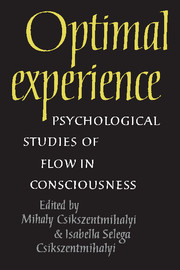Book contents
- Frontmatter
- Contents
- Acknowledgments
- Contributors
- I A THEORETICAL MODEL OF OPTIMAL EXPERIENCE
- II VARIETIES OF THE FLOW EXPERIENCE
- 5 Introduction to Part II
- 6 Bosozoku: flow in Japanese motorcycle gangs
- 7 Women, work, and flow
- 8 The relationship between life satisfaction and flow in elderly Korean immigrants
- 9 Flow and writing
- 10 Flow in solitary ordeals
- III FLOW AS A WAY OF LIFE
- IV THE MEASUREMENT OF FLOW IN EVERYDAY LIFE
- References
- Name index
- Subject index
10 - Flow in solitary ordeals
Published online by Cambridge University Press: 05 June 2012
- Frontmatter
- Contents
- Acknowledgments
- Contributors
- I A THEORETICAL MODEL OF OPTIMAL EXPERIENCE
- II VARIETIES OF THE FLOW EXPERIENCE
- 5 Introduction to Part II
- 6 Bosozoku: flow in Japanese motorcycle gangs
- 7 Women, work, and flow
- 8 The relationship between life satisfaction and flow in elderly Korean immigrants
- 9 Flow and writing
- 10 Flow in solitary ordeals
- III FLOW AS A WAY OF LIFE
- IV THE MEASUREMENT OF FLOW IN EVERYDAY LIFE
- References
- Name index
- Subject index
Summary
It has been argued that extreme physical ordeals, like the ones polar explorers or concentration camp inmates often encounter, are metaphors for life (Frankl 1963). The difference is that in such situations life's fundamental issues stand out more clearly and in higher relief. Others have maintained that play is also a metaphor for life (Huizinga [1939] 1970). Although it may not follow logically from the above that “extreme ordeals are a lot like play,” that statement is in a sense what I propose to address, in the particular form of detailing some striking similarities between the qualities of successful coping with adversity and the qualities of experiences that people find enjoyable.
Csikszentmihalyi's flow concept is the vehicle for linking the psychology of successful coping with the psychology of enjoyment. In his book, Beyond Boredom and Anxiety (1975b), he describes the features of experiences that make them enjoyable. These include being able to (1) merge action and awarenes, (2) center attention on a limited stimulus field, (3) lose oneself in one's activities, (4) control actions and the environment, (5) receive coherent demands for action, and (6) see the activity as self-rewarding. These traits might be reduced to three: getting caught up in what one is doing, controlling what is happening, and creating variety and stimulation so as to make activities novel and challenging enough to stay caught up in them. Many play and recreational activities have these qualities; if the work experience has these qualities, then work too can be experienced as enjoyable (Csikszentmihalyi 1975b).
- Type
- Chapter
- Information
- Optimal ExperiencePsychological Studies of Flow in Consciousness, pp. 172 - 180Publisher: Cambridge University PressPrint publication year: 1988
- 13
- Cited by



